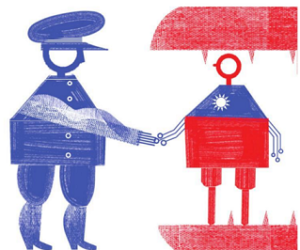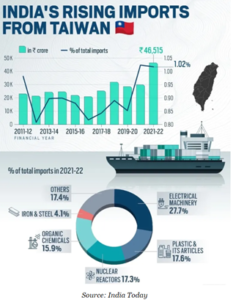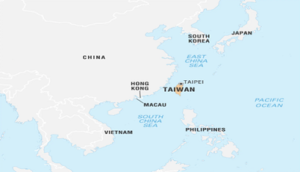Delhi and Taipei, just friends.
Relevance
GS Paper 2.
Bilateral, regional and global groupings and agreements involving India and/or affecting India’s interests.
Tags: #Indiataiwan #indiachina #china #internationalrealtions #currentaffairs #upsc.
Why in News?
The retired Indian service chiefs participated in a maritime affairs seminar organized by a Taiwanese think-tank. While the seminar aimed to foster discussions on maritime matters, the visit’s significance lies in the delicate geopolitics of the region.
Caution in Interpretation:
The media speculation about India’s stance on a potential military conflict between Beijing and Taiwan must be approached with caution. Analysts and observers should avoid over reading the visit’s implications, considering the complex dynamics in the region.
India-Taiwan Ties:
Diplomatic and Economic Ties:
India was the second non-Communist country to recognize the new People’s Republic of China, and since then, has been one of the strongest and particularly vocal supporters of the ‘One China’ concept as interpreted by the PRC.
Absence of Formal Diplomatic Relations: India and Taiwan lack formal diplomatic ties. However Since 1995, both nations have maintained representative offices in each other’s capitals, serving as de facto embassies.
Endorsement of “One-China Policy”: India adheres to the “one-China policy,” recognizing the People’s Republic of China (PRC) as the legitimate government of China.
Economic Ties:
Growing Trade Relations: Trade between India and Taiwan has grown significantly, reaching USD 7.5 billion in 2019, a substantial increase from USD 1 billion in 2000.
Bilateral Investment Agreement: A bilateral investment agreement was signed in 2018, enhancing economic cooperation and investments between the two countries.
Taiwanese Corporate Presence: Approximately 200 Taiwanese companies operate in India, spanning sectors such as electronics, construction, petrochemicals, machinery, Information and Communications Technology (ICT), and auto parts.
Semiconductor Manufacturing Collaboration: Collaborative efforts are underway to establish a semiconductor manufacturing hub in India, reflecting a strategic alignment in technological development.
Cultural and Educational Ties:
Educational Exchanges: Educational interactions have expanded due to a mutual degree recognition agreement inked in 2010. This agreement facilitated greater academic cooperation and student exchanges.
Enhanced People-to-People Ties: Cultural exchanges and educational partnerships have contributed to strengthening people-to-people connections between India and Taiwan.
The India-Taipei Association (ITA) and Taipei Economic and Cultural Centre (TECC) in New Delhi are examples of the exchange.
Taiwan’s Strategic Value:
Taiwan’s expertise in semiconductor technology positions it as a valuable partner for India, considering its global leadership in this field. This unique position adds a dimension of economic and technological collaboration to the evolving relationship.
Significance for India’s Act East Policy and Indo-Pacific Role:
The unfolding Taiwan dynamic holds vital implications for India’s Act East Policy and its Indo-Pacific engagement-
Converging Alliances: Strengthening Taiwan-India relations under the NSP aligns with Australia, the US, and Japan. The Quad framework, focused on a rules-based regional order, offers fertile ground for cooperative ties.
Positive Synergy: Taiwan-India collaboration benefits from Quad’s harmony, fostering trade, research, and defense cooperation. Shared security interests offer avenues for strategic dialogue.
Wider Benefits: Beyond security, a robust Taiwan-India partnership can boost tourism, drive R&D, and enrich educational exchanges.
Taiwan’s South Asian Outreach: Taiwan’s gaze extends to key South Asian nations, with India playing a central role in expanding its regional involvement.
China’s Response and Geopolitical Impact:
Chinese Stance on Taiwan:
China vehemently opposes any official interaction or acknowledgment of Taiwan by foreign nations, asserting that such actions contravene the One China policy.
Possible Chinese Reaction:
China could express objections and adopt diplomatic or economic measures in response to the establishment of the new office, reflecting its firm stance on Taiwan-related matters.
Sensitive Dynamics:
The evolving India-Taiwan relationship carries sensitivity for China, which seeks to diplomatically isolate Taiwan. This has added complexity to the regional dynamics.
Potential Restraint Amidst Tensions:
While the ongoing border tensions between China and India raise the stakes, China may exercise caution to prevent further escalation, acknowledging the prevailing geopolitical sensitivities.
Concerns in the relations:
India’s Diplomatic Connection with Taiwan: India’s diplomatic relations with Taiwan remain undeveloped due to its commitment to the One-China policy.
Impact on Taiwan due to India’s China Policy: The emphasis on enhancing relations with Beijing as part of India’s China policy has resulted in Taiwan’s reduced significance.
Slowdown in India-Taiwan Ties: The progress in India-Taiwan relations was hindered when China objected to the 2018 visit of a female parliamentary delegation from Taiwan to India.
Taiwan’s COVID-19 Success and International Recognition: Taiwan has effectively managed the ongoing COVID-19 pandemic, yet its involvement in the WHO is unfairly obstructed by Beijing. India also has not explored collaboration with Taiwan in pandemic management. Taiwan’s response to COVID-19 underscores the advantages of engaging with the nation.
Unrecognized Potential of Taiwan in the Indo-Pacific Framework: The potential role of Taiwan within the emerging Indo-Pacific framework has been inadequately acknowledged.
Way Forward:
While adhering to the ‘One China’ principle, India should enhance relations with Taiwan, recognizing its de facto sovereignty.
India’s Indo-Pacific-focused foreign policy must consider accommodating Taiwan, aligning with regional dynamics.
Integrating Taiwan into India’s long-term strategy toward China, alongside military readiness and key partnerships, is imperative.
Strengthening people-to-people ties and trade requires public support in Taiwan, encouraging deeper engagement and collaboration with India.
The retired service chiefs’ visit to Taiwan signifies a nuanced interplay of interests and diplomacy in the Indo-Pacific region. While shared concerns about the PRC’s actions and aspirations offer potential for cooperation, historical considerations and complex geopolitics call for a balanced and cautious approach in interpreting the evolving relationship between India and the RoC.
Sources:
https://www.roc-taiwan.org/in_en/post/4745.html
Mains Question:
Q Analyze the challenges and opportunities presented by strengthening relations with Taiwan while adhering to the ‘One China’ policy. How can India strike a balance between its strategic interests and regional stability in the context of its engagement with Taiwan?” 250words.






